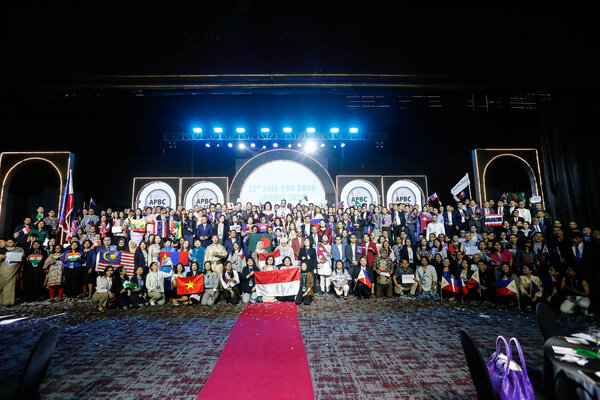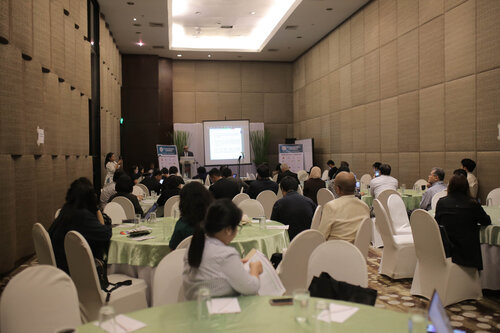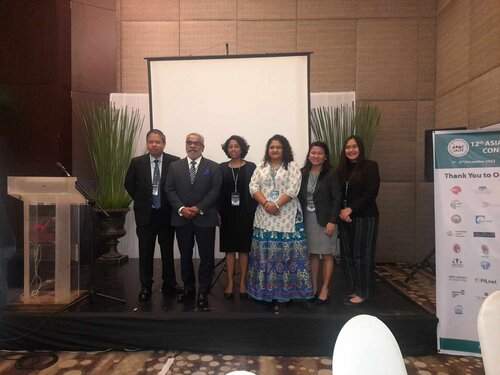- TOP
- 資料館
- FOCUS
- December 2023 - Volume 114
- The 12th Asia Pro Bono Conference and Cross-Border Pro Bono for Migrant Workers
FOCUS December 2023 Volume 114
The 12th Asia Pro Bono Conference and Cross-Border Pro Bono for Migrant Workers
The 12th Asia Pro Bono Conference (12APBC) was held this year at the Waterfront Hotel in Cebu City, Philippines on 1-3 December 2023.
Held annually since 2012, the APBC brings together[1]
various legal service providers, including academics, law students, lawyers, pro bono professionals, policymakers, civil society, and non-profit representatives, from all over the world. The APBC&A2JX's [Asia Pro Bono Conference and Access to Justice Exchange (A2JX)] primary aim is to create and promote dialogue on the various ways pro bono initiatives can strengthen access to justice in Asia and globally. The APBC&A2JX is an exciting mix of keynote speeches, panel discussions, poster presentations and interactive workshop sessions.
With the theme "The Evolution of Empowering Pro Bono and Access to Justice," the three-day 12APBC showcased more than thirty-five inter-active sessions/presentations on best practices in pro bono work in various fields and sectors of society. The 12APBC was attended by more than four hundred in-person and virtual participants from thirty countries.
 12th Asia Pro Bono Conference held at Waterfront Hotel in Cebu City, Philippines on 1 - 3 December 2023.
12th Asia Pro Bono Conference held at Waterfront Hotel in Cebu City, Philippines on 1 - 3 December 2023.
In his live online keynote speech during the opening ceremony, Philippine Supreme Court Chief Justice Alexander G. Gesmundo emphasized the significant role of pro bono lawyering in filling up the large gaps in access to justice and legal aid. Chief Justice Gesmundo also presented an overview of the Philippine Supreme Court's Strategic Plan for Judicial Innovations 2022-2027 (SPJI), the reform agenda being implemented in the Philippine judiciary and legal profession.
Pro Bono for Migrant Workers
One of the most attended presentations of the 12APBC was the workshop jointly sponsored by the Migrant Forum in Asia (MFA) and by the Lawyers Beyond Borders Philippines (LBB Philippines) entitled "Pro Bono Cross Border Litigation for Migrant Workers' Cases: Issues and Challenges."
In this session, representatives from the national bar associations of Malaysia, Indonesia, the Philippines and South Korea made separate presentations on the issues and challenges faced by pro bono lawyers/Bar councils in handling and coordinating cross-border litigation of migrant workers cases (involving issues such as forced labor, wage theft, and social protection) in the countries of origin and in the countries of destination. This session also provided an avenue to discuss their capacities and constraints in providing the legal services, pro bono or otherwise, and how they could strengthen their cross-border collaboration in litigating cases involving migrant workers.
 MFA-LBB Philippines workshop entitled "Pro Bono Cross Border Litigation for Migrant Workers' Cases: Issues and Challenges"
MFA-LBB Philippines workshop entitled "Pro Bono Cross Border Litigation for Migrant Workers' Cases: Issues and Challenges"
The first presenter in this session was Dato' Sri M. Ramachelvam, Co-Chairperson of the Migrants, Refugees and Immigration Affairs Committee of the Bar Council of Malaysia. He identified the following effective practices that Bar Associations have adopted to handle cross-border cases: (a) collaboration between national bar associations through their pro bono programs (e. g., the Integrated Bar of the Philippines [IBP] and PERADI of Indonesia); (b) liaising with pro bono lawyers through regional networks (e. g., Lawyers Beyond Borders [LBB] and ASEAN Bar Coalition on Migration [ABACOM]); (c) close collaboration with Migrant Forum in Asia (MFA); (d) utilization of non-judicial mechanisms such as mediation, arbitration, and negotiation, both private and court-mandated; (e) utilization of business grievance mechanisms such as remediation, counselling, negotiation and compensation; and (f) utilization of industry remedial mechanisms such as the Responsible Business Alliance, Fair Labour Association, and the Roundtable on Sustainable Palm Oil.
Dato' Sri M. Ramachelvam also discussed the challenges encountered in their pro bono work, such as: (a) non-availability of legal assistance to migrant workers in the country of destination; (b) the long period of time to resolve cases in the existing legal and administrative systems; (c) no right to stay and to work pending resolution of the case, thus leading to deportation while cases are ongoing; (d) the vulnerable status of undocumented workers; (e) difficulties in accessing courts and administrative tribunals; (f) lack of information on legal rights and options available; (g) lack of financial resources; (h) language barrier; (i) fear of retaliation by employers; (j) xenophobia and discrimination against migrant workers; and (k) no equality in social protection for migrant workers.
In order to address the challenges encountered, Dato' Sri M. Ramachelvam recommended the following:
- Governments should adopt the ILO General Principles and Operational Guidelines on Fair Recruitment into their policies;[2]
- Migrant workers should be allowed to transfer employment pending resolution of the labor dispute or case; and to allow migrant workers to continue with new employment after the resolution of the case;
- Remove unilateral rights of employers to terminate migrant workers without approval of relevant government officials overseeing migrant workers;
- Extend the government legal aid schemes to migrant workers for civil, labor and criminal cases; and
- Governments should ensure that migrant workers have access to grievance and dispute resolution mechanisms while in the country of destination and also in cases where the migrant workers have already returned to their countries of origin.
The second presenter was Atty. Myline Urmenita-Palisoc, the over-all Deputy Director of the National Center for Legal Aid (NCLA) of the Integrated Bar of the Philippines (IBP). She discussed the nature and mandate of the IBP as the mandatory and official organization of all Filipino lawyers. While the IBP has 85,117 roster members, it has only 1,473 lawyers, or merely 1.7 percent of the total number of lawyers, who are doing volunteer or pro bono legal services.
Atty. Urmenita-Palisoc enumerated the challenges encountered from the perspective of a country of origin as follows: (a) legal complexities of migrant workers' cases which involve laws of different jurisdictions; (b) language barrier; (c) logistical challenges; (d) employer power dynamics; (e) recognition of foreign legal credentials; (f) lack of awareness on the part of the migrant workers on the rights and remedies available to them; and (f) inconsistent immigration and labor policies in many countries.
She stressed that advocacy for systemic legal reforms is needed in order to protect the rights of migrant workers.
The third speaker of the session was Advocate Nirmala Many, Secretary of the Pro Bono Center of the Indonesian Bar Association (PERADI) National Board (2017-2020). Advocate Many discussed the legal framework of pro bono under Indonesian laws.
She also presented the on-going initiatives of PERADI on cross-border litigation and referral such as: (a) collaboration through Memoranda of Understanding (MoUs) with the International Organization for Migration (IOM) and Lembaga Bantuan Hukum - Jakarta; (b) communications with the Ministry of Foreign Affairs regarding standard labor contract that Indonesian embassies/consulates in the countries of destination could refer to; and (c) effective consultations with the Migrant Workers Protection Board.
The key initiatives being proposed by Advocate Many include: (a) the establishment of a Migrant Worker Task Force and Lawyers Beyond Borders Indonesia; (b) effective collaboration with United Nations Agencies, non-governmental organizations, Bar Associations, governments and law enforcers; and (c) more effective collaboration with regional and international organizations such as the Lawyers Beyond Borders and ABACOM.
The final speaker was Atty. Pillkyu Hwang, the Chair of the Committee on International Human Rights of the Korean Bar Association and Executive Director of the Transnational Human Rights Institute at Gonggam Human Rights Law Foundation. He made an online presentation on the pro bono legal assistance being extended by the Korean Bar Association to migrant workers, especially the seasonal farm workers, in South Korea.
 Presenters at the MFA-LBB Philippines workshop (from left to right): Atty. Henry S. Rojas, Dato' Sri M. Ramachelvam, Advocate Nirmala Many, Sumitha Shaanthinni Kishna, MFA Chairperson, Atty. Myline Urmenita-Palisoc.
Presenters at the MFA-LBB Philippines workshop (from left to right): Atty. Henry S. Rojas, Dato' Sri M. Ramachelvam, Advocate Nirmala Many, Sumitha Shaanthinni Kishna, MFA Chairperson, Atty. Myline Urmenita-Palisoc.
Atty. Henry S. Rojas of LBB Philippines and Ms. Abigail Guevarra, Program Assistant of MFA, moderated the session presentations.
Henry S. Rojas is the President of Lawyers Beyond Borders Philippines.
For further information, please contact Henry S. Rojas at lbbphilippines_2015@hotmail.com.
[1] See www.probonoconference.org/conference-reports/.
[2] ILO General Principles and Operational Guidelines on Fair Recruitment, text available at www.ilo.org/wcmsp5/groups/public/---ed_protect/---protrav/---migrant/documents/publication/wcms_703485.pdf.
